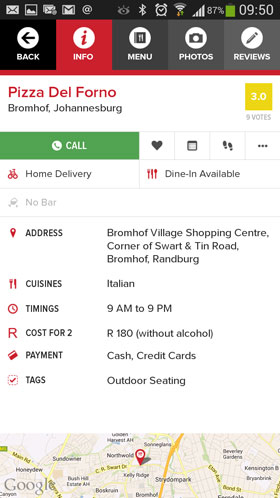
Zomato, a restaurant review service launched quietly in Johannesburg in April, is about to take its service live in Cape Town, too. Thereafter, the Indian company behind it plans to expand elsewhere in South Africa and in Africa more broadly.
Zomato began life as Foodiebay.com. It was founded by in Delhi by Indian Institute of Technology graduate Deepinder Goyal and today has more than 60m registered users in India, the Philippines, Qatar, South Africa, Sri Lanka, the United Arab Emirates and the UK.
It already offers information on more than 2 300 restaurants in Johannesburg. Each listing is checked and updated every 90 days.
Zomato head of international operations Albinder Dhindsa says the company does a thorough survey before launching in new markets. South Africa ticked most of the boxes.
The company decided to launch in Johannesburg before Cape Town because it offered a better mix of dine-in, take-out and nightlife spots. This, Dhindsa says, makes it easier to monetise in the long term.
“Cape Town was a lot more stacked towards dining out. Also, we’re always a little worried about places that have ‘dining destinations’ in them, like the waterfront in Cape Town. The impression we got was that Johannesburg people are more willing to try different neighbourhoods.”
Zomato has a team of eight working on the Johannesburg listings, half of them local. A Cape Town office will be set up soon.

“We don’t believe in user-generated content for our core information because you don’t know if it’s correct or up to date … and if you disappoint users once it’s tough to get them back.”
Zomato offers access to its service via mobile applications — available for all the major platforms — and via its website. Most Johannesburg users, at least so far, favour the website. Demand peaks on Fridays, and plummets on Saturdays and Sundays. “It’s basically because young professionals don’t always have Internet at home,” Dhindsa says.
Restaurants that want their information updated on Zomato can simply e-mail its content team, which promises a turnaround of 24 hours. Restaurant owners can also upload information themselves using the website, but it won’t be live until it has been checked by Zomato staff.
Diners can post reviews, but these are vetted for abusive language and moderated for usefulness. This is done within 24 hours, too. When reviews are rejected, diners are notified why.
Zomato takes various measures to ensure competitors don’t try to slander rivals and, similarly, that restaurants don’t try to falsely boost their own ratings.
The company is now eyeing other African markets, but not before it has a handle on South Africa. “We were bullish on Egypt for a while, and we scouted out Kenya, but decided it is not for us because the restaurant industry is not very organised. Nigeria is another one on the backburner because we’ve been too busy elsewhere, but it’s an enormous market with potential.”
The company makes money by serving geo-targeted banner advertisements to users of its website. These ads are sold to restaurants with guarantees that they’ll only be served to people in or around the area the restaurant is located. — (c) 2013 NewsCentral Media



